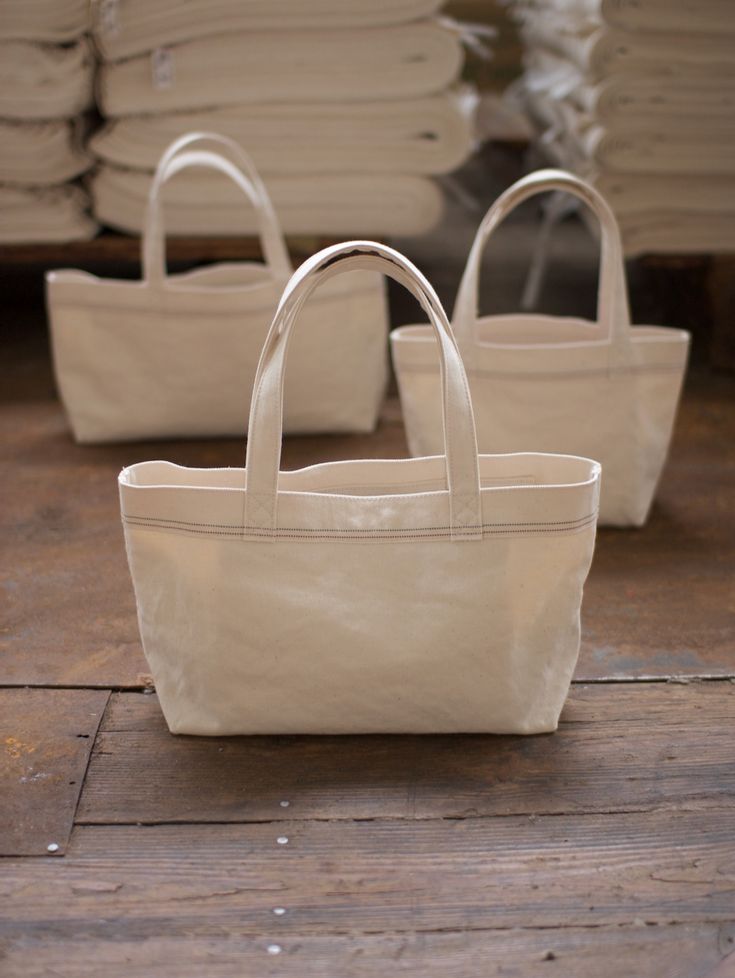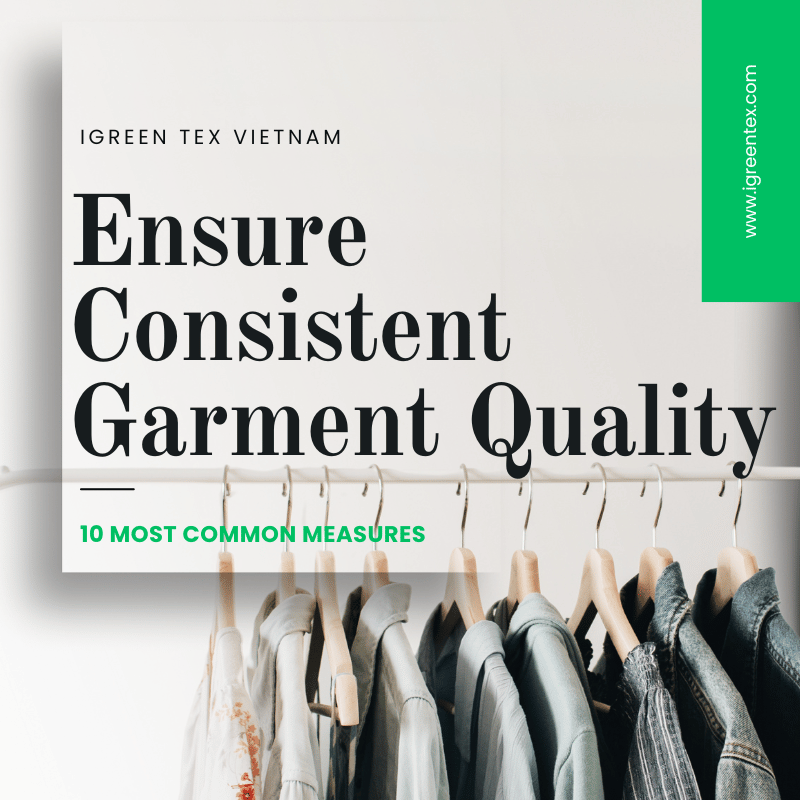- Garment Factories in Vietnam have been chosen for Cost and Quality. Let’s find out 5 reasons why!
- Competitive Labor Costs Offering Significant Value
- Commitment to High-Quality Production and Skilled Craftsmanship
- Favorable Trade Agreements and Political Stability
- Continuously Improving Infrastructure and Logistics Network
- Growing Emphasis on Sustainability and Ethical Practices
- Conclusion: Your Strategic Advantage Lies with Garment Factories in Vietnam
- About IGREEN TEX
- IGREEN TEX VIETNAM CO LTD
Garment Factories in Vietnam have been chosen for Cost and Quality. Let’s find out 5 reasons why!
Choosing the right manufacturing partner is crucial for fashion brands. It directly impacts product quality, cost efficiency, and brand reputation. In recent years, Vietnam has emerged as a leading global hub. Many international brands now select garment factories in Vietnam. They seek a balance between competitive pricing and high production standards.
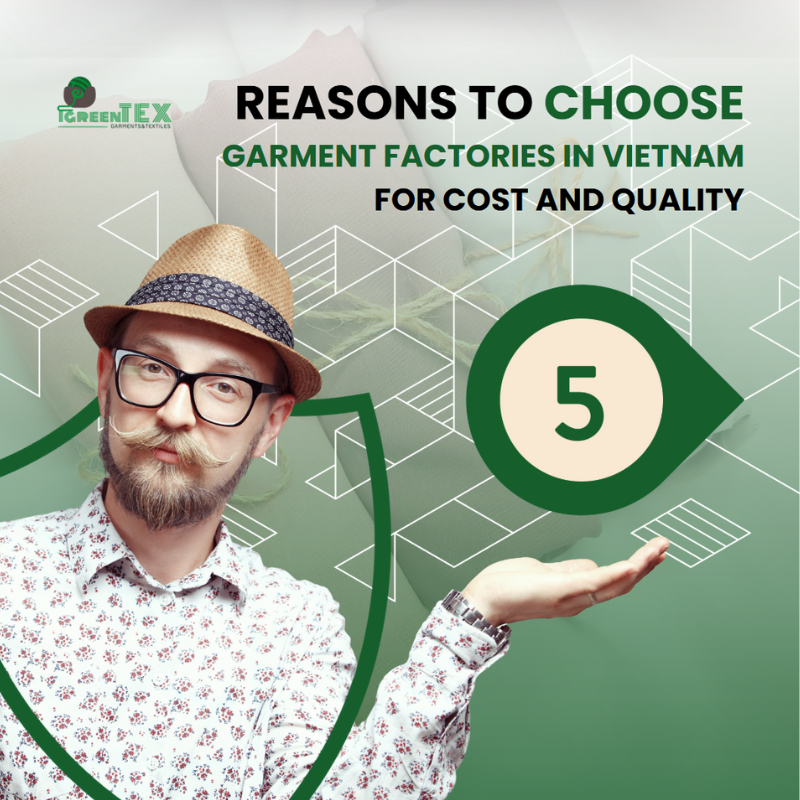
This shift is not accidental. It results from several key advantages Vietnam offers. This article explores five compelling reasons for this trend. We will examine why Vietnam is a preferred destination. This is especially true for small and medium enterprises (SMEs). These businesses need reliable, high-quality apparel production for export. Understanding these factors helps businesses make informed sourcing decisions. Let’s delve into why garment factories in Vietnam attract top brands.
See more: Competitive Prestige Jacket Manufacturer in Vietnam
See more: The Secret of Combining Cotton and Spandex for Casual Shirts
See more: Vietnamese Clothing Manufacturers Search for on Google Maps
See more: THE FUTURE STARS OF VEGAN AND SUSTAINABLE FASHION
See more: COFFEE YARN
See more: LASTEST TRENDS OF SUSTAINABLE MANUFACTURING
Competitive Labor Costs Offering Significant Value
Cost-effectiveness remains a primary driver in manufacturing decisions. Vietnam presents a strong advantage in this area. Labor costs here are significantly more competitive than in China. They are also lower than many other established manufacturing nations. This lower cost does not mean lower skill, however. The workforce in Vietnamese apparel factories is increasingly skilled. They possess a growing expertise in complex garment construction. This translates to considerable savings for brands. Especially those producing large volumes find this appealing. Lower operational expenses allow brands to invest elsewhere. They can focus on design, marketing, or sustainable materials.
The value proposition extends beyond just the hourly wage. Vietnamese workers are known for their diligence and dexterity. Many garment factories in Vietnam invest in continuous training programs. This enhances worker productivity and efficiency over time. Efficient workflows minimize waste and reduce production lead times. This combination of affordable labor and high output is attractive. It allows brands to maintain healthy profit margins. They can achieve this without compromising on the final product. For SMEs, managing costs is particularly vital. Accessing affordable yet skilled labor is a major benefit. It helps them compete effectively in the global marketplace. Vietnam offers a sustainable cost structure for long-term partnerships.
Furthermore, the government supports vocational training initiatives. This ensures a steady supply of qualified workers for the industry. The focus is shifting from basic sewing to complex operations. This includes pattern making, quality control, and machine maintenance. This skilled pool benefits companies seeking advanced manufacturing capabilities. Therefore, the competitive labor cost is a cornerstone. It makes garment factories in Vietnam a strategic choice. Brands gain excellent value for their investment. This cost advantage is a foundational element of Vietnam’s appeal.
Commitment to High-Quality Production and Skilled Craftsmanship
While cost is important, quality is paramount for brand reputation. Garment factories in Vietnam are increasingly recognized for high standards. They consistently deliver well-made apparel products. This reputation is built on a foundation of skilled craftsmanship. Vietnam has a long tradition in textiles and garment making. This heritage translates into a workforce with inherent attention to detail. Many factory workers possess intricate sewing skills. They are capable of handling delicate fabrics and complex designs. This capability is crucial for brands targeting mid-range to high-end markets. Quality is not merely about skill; it involves robust processes.
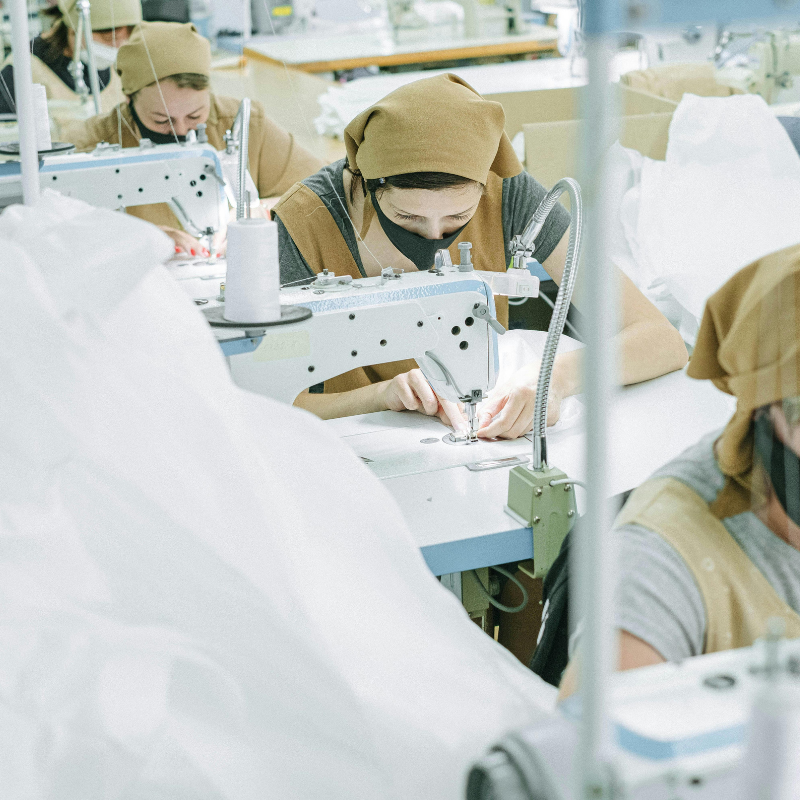
Leading garment factories in Vietnam implement strict quality control systems. These systems often adhere to international standards like ISO. Quality checks occur at multiple stages of production. They start from raw material inspection to final garment review. This meticulous approach minimizes defects and ensures consistency. Brands can trust that products meet their exact specifications. Investment in modern technology also plays a significant role. Many factories utilize advanced sewing machines and cutting equipment. Computer-aided design (CAD) and manufacturing (CAM) systems are common. This technology improves precision and reduces human error. It contributes significantly to overall product quality.
Moreover, factory management often possesses strong technical expertise. They understand international quality expectations and compliance requirements. They work closely with brands to achieve desired outcomes. This collaborative approach ensures alignment on quality standards. Companies like iGreen Tex Vietnam exemplify this commitment. They often highlight their quality management processes. They showcase their ability to meet diverse client needs effectively. This focus reassures international buyers. They know their brand image is protected by reliable manufacturing. The dedication to quality makes garment factories in Vietnam reliable partners. They help brands build customer loyalty through superior products. This commitment differentiates Vietnam from purely low-cost options.
The skilled workforce is adept at various garment categories. They handle everything from basic knits to complex outerwear. Their versatility allows brands to consolidate production lines. Working with a single, capable Vietnamese partner streamlines operations. This capability reduces logistical complexity and improves communication. Ultimately, the focus on quality builds long-term relationships. Brands return to Vietnamese manufacturers due to proven reliability. They trust the consistent delivery of high-standard apparel. This trust is invaluable in the competitive fashion industry.
Favorable Trade Agreements and Political Stability
Vietnam’s integration into the global economy offers significant advantages. The country benefits from numerous Free Trade Agreements (FTAs). Key examples include the EU-Vietnam FTA (EVFTA). Another important one is the Comprehensive and Progressive Agreement for Trans-Pacific Partnership (CPTPP). These agreements provide preferential market access for Vietnamese goods. Brands manufacturing in Vietnam can benefit from reduced or eliminated tariffs. This applies when exporting to major markets like the EU, Canada, Australia, and Japan. Lower import duties translate directly into cost savings. It enhances the competitiveness of products sourced from Vietnam.
These FTAs simplify customs procedures as well. They create a more predictable and streamlined trading environment. This reduces administrative burdens and potential delays for businesses. For SMEs, navigating international trade can be challenging. The clear frameworks provided by FTAs are a significant help. They make exporting from garment factories in Vietnam more accessible. Beyond trade deals, Vietnam offers relative political and economic stability. The government actively encourages foreign investment, particularly in manufacturing. Consistent economic policies create a reliable business climate. This stability minimizes risks associated with supply chain disruptions. Brands value this predictability for long-term planning.
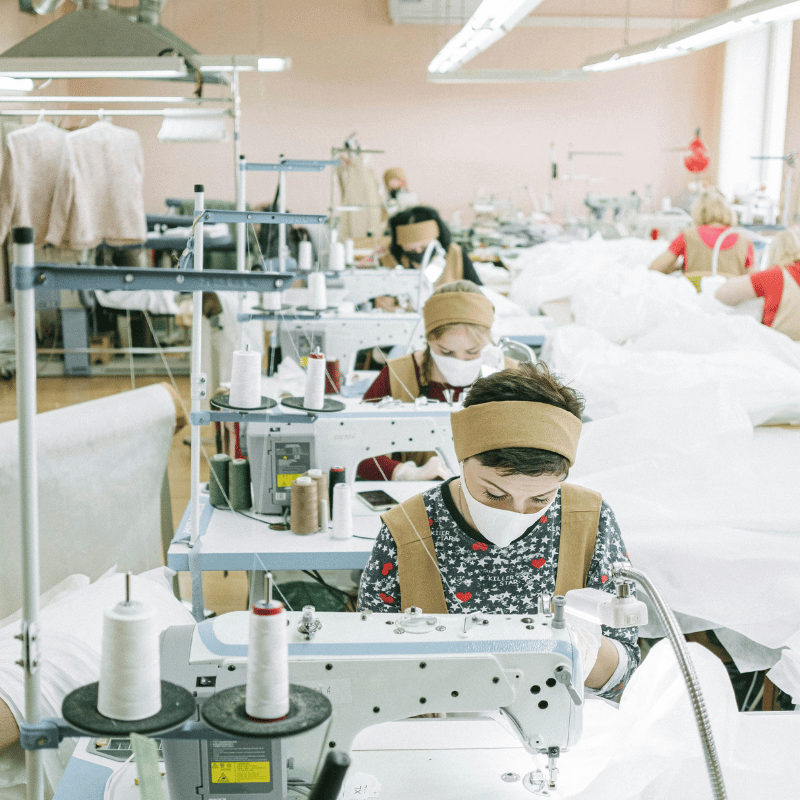
The stable environment fosters continuous development within the industry. Infrastructure improvements and regulatory reforms support manufacturing growth. This contrasts with potential volatility in other sourcing regions. Choosing garment factories in Vietnam provides a measure of security. Businesses can plan production cycles with greater confidence. They face fewer unexpected political or economic challenges. This stability is crucial for maintaining consistent supply chains. It ensures products reach global markets on schedule. The combination of beneficial FTAs and stability is compelling. It creates a secure and cost-effective sourcing destination. This environment encourages long-term investment and partnerships. It solidifies Vietnam’s position as a strategic manufacturing hub.
Furthermore, these agreements often include provisions on labor standards. They also cover environmental protection. This aligns with growing global demands for responsible sourcing. Manufacturing in Vietnam helps brands meet these expectations. Compliance with FTA requirements enhances brand reputation. It shows commitment to ethical and sustainable practices. This aspect further strengthens the appeal of garment factories in Vietnam.
Continuously Improving Infrastructure and Logistics Network
Efficient logistics are essential for global supply chains. Vietnam has made substantial investments in its infrastructure. This development directly supports the growing manufacturing sector. Major ports like Hai Phong and Cai Mep have been expanded. They are equipped with modern container handling facilities. These improvements increase shipping capacity and reduce turnaround times. Efficient port operations mean faster export processes. Goods produced in garment factories in Vietnam reach international markets quicker. This speed is critical in the fast-paced fashion industry. Brands need to respond rapidly to changing trends.
Road networks connecting industrial zones to ports are also improving. New highways and upgraded roads facilitate smoother transportation of goods. This reduces inland transit times and logistics costs. Reliable road transport ensures raw materials reach factories promptly. Finished products move efficiently to export hubs. This integrated transport system enhances overall supply chain efficiency. Air freight capabilities are also expanding. Major airports in Hanoi and Ho Chi Minh City handle increasing cargo volumes. This provides options for time-sensitive shipments. Brands requiring faster delivery can utilize air cargo services. This flexibility supports diverse logistical needs.
The development extends to industrial parks and zones. Many modern parks offer integrated utilities and logistics services. Garment factories in Vietnam located in these zones benefit greatly. They have easy access to power, water, and waste treatment. On-site customs clearance facilities are sometimes available. This further streamlines the export process. Efficient logistics minimize the risk of delays. They help brands maintain inventory levels and meet delivery deadlines. Reliable infrastructure reduces hidden costs associated with transportation issues. This contributes to the overall cost-effectiveness of sourcing from Vietnam.
Companies investing in Vietnam recognize these logistical strengths. The ongoing government focus on infrastructure ensures continued improvement. This commitment provides confidence for long-term sourcing strategies. Reliable logistics support the seamless flow of goods globally. This capability is essential for brands serving international customers. Efficient infrastructure underpins the success of garment factories in Vietnam. It ensures they can compete effectively on a global scale. It complements the advantages of cost and quality. This makes Vietnam a well-rounded manufacturing location.
Growing Emphasis on Sustainability and Ethical Practices
Modern consumers and brands increasingly prioritize ethical production. Sustainability is no longer optional; it is a core requirement. Garment factories in Vietnam are responding to this demand. Many manufacturers are actively improving their environmental and social performance. There is a growing focus on sustainable materials and processes. Factories explore options like organic cotton and recycled polyester. They invest in water-saving dyeing techniques. Energy efficiency measures are being implemented in production facilities. This includes using LED lighting and solar power. These initiatives reduce the environmental footprint of garment production.
Ethical labor practices are also gaining prominence. Vietnamese labor laws provide a framework for worker rights. Reputable factories strive to exceed these basic requirements. They focus on fair wages, reasonable working hours, and safe working conditions. Many factories undergo social compliance audits. These audits are often required by international brands. Certifications like WRAP (Worldwide Responsible Accredited Production) are sought after. They demonstrate commitment to ethical manufacturing standards. Choosing ethically compliant partners protects brand reputation. It aligns with corporate social responsibility (CSR) goals.
Forward-thinking manufacturers see sustainability as a competitive advantage. Companies such as iGreen Tex Vietnam often emphasize their eco-friendly approaches. They might detail their use of sustainable fabrics or waste reduction programs. This transparency appeals to brands committed to responsible sourcing. It helps build trust and long-term partnerships. The Vietnamese government also encourages sustainable development. Policies support green technologies and resource efficiency. This creates a supportive ecosystem for sustainable manufacturing. Brands can find partners aligned with their sustainability values. This is increasingly important for market positioning.
Consumers, especially in Western markets like the US, demand transparency. They want to know where and how their clothes are made. Sourcing from garment factories in Vietnam known for ethical practices helps meet this demand. It allows brands to tell a positive sourcing story. This resonates with conscious consumers and enhances brand loyalty. The focus on sustainability adds another layer of value. It goes beyond just cost and quality considerations. It addresses the ethical dimensions of global supply chains. This commitment positions Vietnam favorably for the future. It ensures its continued relevance as a leading garment producer.
Conclusion: Your Strategic Advantage Lies with Garment Factories in Vietnam
Vietnam’s transformation into a global apparel manufacturing powerhouse is undeniably complete. It offers far more than just another sourcing location on the map. Choosing Vietnam represents a decisive strategic move for forward-thinking fashion brands. The nation presents a unique, powerful synergy of compelling advantages.
Garment factories in Vietnam combine directly address the multifaceted needs of modern apparel businesses. Competitive labor costs deliver immediate, tangible financial benefits. These savings empower significant reinvestment into your brand’s innovation and growth. Crucially, this affordability aligns perfectly with exceptional production expertise. Garment factories in Vietnam provide outstanding value that extends far beyond simple cost reduction. It unlocks vital potential for enhanced profitability and stronger market competitiveness. Selecting garment factories in Vietnam signifies intelligent resource allocation for your enterprise’s future.
The unwavering commitment to high-quality production forms a crucial pillar. It’s the foundation of Vietnam’s manufacturing appeal. Skilled artisans, often benefiting from established training programs, ensure meticulous craftsmanship. Reputable garment factories in Vietnam consistently meet and exceed stringent international standards. They achieve this through rigorously implemented quality control systems at every stage. Garment factories in Vietnam have made significant investments in modern technology, further enhancing precision, consistency, and efficiency.
Garment factories in Vietnam relentless focus safeguards your brand’s invaluable reputation for excellence. Partnering here means consistently delivering products your customers will trust, value, and return for. It translates directly into lower defect rates and heightened customer loyalty. This inherent reliability builds the bedrock for sustainable, long-term brand growth. You gain operational peace of mind.
Furthermore, Vietnam provides a remarkably stable and advantageous operational ecosystem. Its extensive network of Free Trade Agreements creates significant global opportunities. Brands manufacturing here gain preferential, tariff-reduced access to major world markets. This market accessibility pairs effectively with impressive political and economic stability. Businesses can confidently develop and execute long-term sourcing strategies. Supply chain risks linked to geopolitical volatility are substantially minimized compared to other regions. This predictability is a priceless asset in today’s fast-changing global commerce landscape. Garment factories in Vietnam operate securely within this supportive framework. This stability ensures smoother operational flows and dependable production schedules for international partners. It fosters trust and encourages long-term relationships.
The nation’s clear dedication to continuous improvement is evident everywhere. Ongoing infrastructure development fuels seamless, efficient logistics operations nationwide. Modernized deep-water ports and expanding integrated transport networks guarantee timely global delivery. This critical speed-to-market capability supports the dynamic demands of the fashion industry. Equally compelling is the rapidly growing emphasis on truly responsible manufacturing. Ethical labor practices and genuine environmental sustainability are increasingly central to operations. Leading manufacturers actively demonstrate these commitments.
For example, the focus on transparent partnerships and sustainable solutions, often emphasized by garment factories in Vietnam such as iGreen Tex Vietnam, showcases the collaborative and responsible potential readily available. iGreen Tex Vietnam, known for its dedication to eco-friendly processes and clear communication, exemplifies the type of modern partner brands can find. Partnering with such conscientious factories strongly aligns your brand with discerning consumer values. It helps construct the positive, transparent brand narrative increasingly demanded globally.
Ultimately, the strategic decision to partner with garment factories in Vietnam is compelling. It offers an optimal, hard-to-replicate balance of essential business drivers. You secure vital cost-efficiency without compromising on superior product quality. You gain access to reliable, scalable production within a stable, globally connected framework. You effectively align your brand identity with crucial ethical and sustainable manufacturing practices, finding partners like iGreen Tex Vietnam who champion these values. For small and medium enterprises aiming for export-ready, high-caliber apparel production, garment factories in Vietnam clearly stands out.
It provides the essential foundation for building resilient, competitive, and genuinely responsible supply chains. Choosing Vietnam is not merely sourcing; it is strategically positioning your brand for enduring future success. The trajectory remains positive: Vietnam’s dynamic garment industry offers a bright, reliable, and increasingly sustainable future for its global partners.
About IGREEN TEX
IGREEN TEX is a provider of fashion and textile products, offering a wide range of both domestically and internationally. Our commitment to quality ensures that our products not only meet the highest standards but also promote eco-friendly practices, in Vietnam sportswear manufacturing.
To view product information click here
Visit our website to learn more about our products and services: IGREEN TEX
IGREEN TEX VIETNAM CO LTD
Address: No. 83, A4 Street, Ward 12, Tan Binh Dist, HCMC
E-mail: info@igreentex.com
WhatsApp/Viber/Zalo: +84938.045.900
